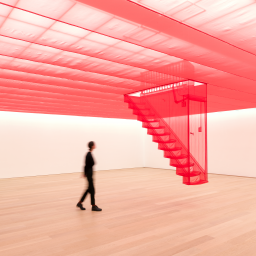A listless security guard in Russia damaged a major modernist painting by drawing cartoon eyes on the work during his first day on the job.
The addition to the painting, titled Three Figures and completed by Anna Leporskaya in 1934, was spotted in early December by visitors to the Boris Yeltsin Presidential Center in Yekaterinburg, where the canvas was included in a survey of 20th-century Russian avant-garde art.
The work, which was scribbled upon with a Boris Yeltsin Presidential Center-branded pen, was promptly removed and returned to the State Tretyakov Gallery in Moscow, which owns the work. Meanwhile, protective screens were installed over the other artworks in the show.
The painting was begun in 1932 and depicts a trio of featureless heads. It was insured for 75 million roubles, or roughly $1 million.
Upon examination, conservators determined that the vandal penetrated a top layer of paint and caused some pigment on the left-hand face to crumble, but otherwise did not apply enough pressure to inflict significant damage, according to the Art Newspaper, which first reported the story.
Experts estimate that restoration will cost 250,000 roubles ($3,300) and can be done without further jeopardizing the canvas.

Anna Leporskaya’s Three Figures (1932–34) before it was vandalized. Courtesy of the Boris Yeltsin Presidential Center.
Conservation work is already underway, and has been paid for by the insurance company, the Yeltsin Center said in a statement.
The security guard, who worked for a private company hired by the Yeltsin Center, has since been fired.
“His motives are still unknown, but the administration believes it was some kind of a lapse in sanity,” the show’s curator, Anna Reshetkina, told Russian news outlets.
Because of the limited damage to the artwork, Yekaterinburg’s ministry of internal affairs initially declined to press charges. However, after news of the incident went public, the Russian Federation’s ministry of culture issued a complaint to the office of the prosecutor general requesting that the security guard’s action be reclassified as “destruction or damage to cultural heritage objects.”
Following the complaint, a criminal case was opened under a lesser charge of vandalism. If the guard is found guilty, he could face a fine, a compulsory work sentence, and up to three months in prison.










